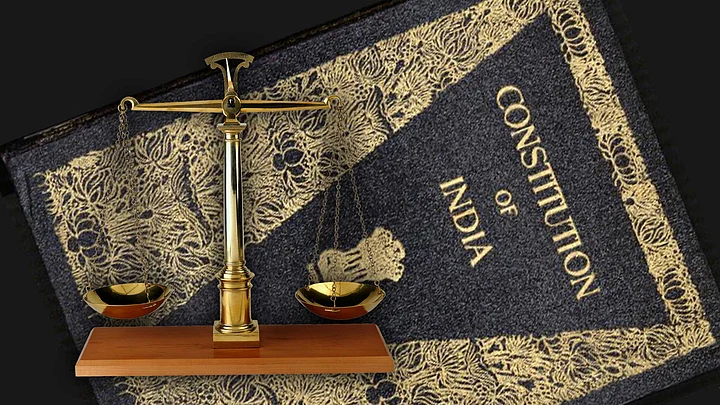A strange atmosphere prevails in the country with certain people questioning India’s secular character. There is a sudden emergence of some right-wing fundamental agents whose intolerant stance reeks of outdated and antiquated philosophies. It is in this backdrop that the Allahabad High Court last week sought to quell the upheaval over the basic character of our Constitution by saying India is “secular” in all respects.
India’s Constitution and its Preamble had undergone an amendment when, under Indira Gandhi, the words “socialistic” and “secular” were included.
In a significant judgement, the Allahabad High Court disagreed with the petitioner, an organisation by the name of Hindu Front For Justice. The outfit claimed that the addition of these two words “is giving a wrong impression and creating havoc in public life and in smooth functioning of the nation”.
Constitutional Validity of 42nd Amendment
The little-known outfit had challenged the competence of the Parliament to amend the Preamble since it’s not provided in any of its provisions. The petitioner’s contention was that the ‘socialist’ and ‘secular’ concepts were not conceived by the founding fathers of the Constitution and, therefore, “cannot be thrust upon the public”.
It was a case that challenged the constitutional validity of Section 2 (a) of the Constitution (Forty-second Amendment) Act, 1976. The Front had contended that the Parliament “has no legislative competence to amend the Preamble and to introduce or delete there from any word or expression in exercise of the powers conferred under Article 368 of the Constitution of India”.
It had also stated that the Preamble “does not come within the ambit of ‘any provision’ of the Constitution and it is a declaration of ideals conceived by the Constitution makers.”
Amendments to Preamble
However, a bench of Justices Dinesh Maheshwari and Anant Kumar weren’t impressed with the arguments. The bench held that even in Minerva Mills Ltd (1980), the Supreme Court had declared Sections 4 and 55 of the 42nd Amendment Act as unconstitutional. But the Supreme Court had held that the “amendment to the Preamble by the same enactment was unexceptionable and stood consistently with the creed of the Constitution while giving vitality to its philosophy”.
No exception could be taken to the amendments to the preamble as they “are not only within the framework of the Constitution but they give vitality to its philosophy; they afford strength and succour to its foundations”.
Secular Ideals of the Constitution
- In a recent judgement, the Allahabad High Court disagreed with an outfit, the ‘Hindu Front for Justice’ which had challenged the 42nd Amendment Act.
- Petitioner had claimed that the addition of the two words ‘socialist’ and ‘secular’ is not in sync with the spirit of the Constitution.
- Case even challenged the competence of the Parliament to amend the Preamble since it’s not in any Constitutional provisions.
- However, Supreme Court in Minerva Mills Ltd case in 1980 had held that the amendment to the Preamble was unexceptionable.
Amending Power of Parliament
After amending the Preamble, what was originally described as a ‘Sovereign Democratic Republic’ became a “Sovereign Socialist Secular Democratic Republic”. The resolution to promote the ‘unity of the nation’ was “elevated into a promise to promote the unity and integrity of the nation”.
The judges further said that these amendments furnish the most eloquent example of how the amending power can be exercised consistently with “the creed of the Constitution”. “They offer the promise of more; they do not scuttle a precious heritage”, the judges said while reiterating what the top court had asserted in 1980.
Thus, all the contentions urged by the petitioner, the Hindu Front for Justice, were deemed to be “redundant and unnecessary”.
The judges also rejected the suggestion made by the Front that the addition of the expressions ‘secular’ and ‘socialist’ is thrusting new or different ideals. This contention was fundamentally flawed because “these principles and ideals have always been ingrained in the scheme of the Constitution of India”, the high court stressed.
Tinkering with the Preamble
This judgement assumes significance in view of repeated attempts being made by different organisations to tinker with the Preamble in order to undo what had been done by Parliament forty years ago.
It may be pointed out that even before the 42nd Amendment Act had come into being, the majority view taken by judges in Kesavananda Bharati’s case in 1973 had pointed out that “India is a secular State in which there is no State religion”.
Kesavananda Bharati judgementSpecial provisions have been made in the Constitution guaranteeing the freedom of conscience and free profession, practice and propagation of religion and the freedom to manage religious affairs.
Political Connotation of ‘Secularism’
During the two-day special sitting of Parliament in November last year, Home Minister Rajnath Singh had said, “Because of the rampant misuse of the word (secularism), there have been instances of tension in the society”. His speech invited sharp criticism from the opposition, led by Congress president Sonia Gandhi. Rajnath Singh had indirectly criticised the inclusion of the word “secular” in the Preamble saying Ambedkar had never thought of putting the term ‘secularism’ in the Preamble as it was “inbuilt in the Indian system”.
Sonia Gandhi responded by saying people who never had faith in the Constitution were now swearing by it. “There cannot be a bigger joke” than the fact that those “who never had faith in the Constitution nor had they participated in its drafting, are now swearing by it and are laying claim to it,” she had said attacking the Modi government and the ruling party at large.
(The writer is a Delhi-based senior journalist.)
Also Read:
